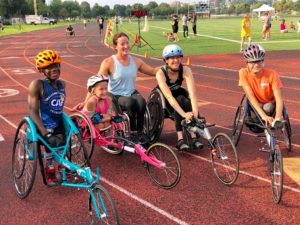The 5thAnnual Martin Richard Memorial Mile was held at South Boston’s Joe Moakley Park this Thursday, and for the 5thtime, Adaptive Sports New England was there to encourage and facilitate participation by individuals who have a visual or mobility impairment. “Inclusion” is the word used to describe this, but only because it can be juxtopposed by “exclusion,” which is the accepted standard – or is it?
Elsewhere on this site you will find stories of Matt Frietas playing lacrosse for Catholic Memorial, Owen Ankatell playing tennis for Hudson High School, Chris Kimball running cross country for Nichols College, and Mikayla Chandler throwing discus and shot put for Old Rochester Regional High School. Each of these athletes participates on a varsity team not because they are being explicitly included, but because they are talented, hard-working athletes. The inclusion all happens in the background.
Matt just showed up for tryouts his freshman year, earned his spot, and last year shared duties as the starting goalie for CM lacrosse. In Owen’s case, the U.S. Tennis Association rulebook includes a section on “One-up, One-down” to accommodate players who use a wheelchair; the MIAA follow the USTA rules, and Owen is good enough to have played varsity – even winning a singles match his senior year. Nichols College’s athletic department petitioned the NCAA Division III Committee to allow Chris, who is legally blind, to run with a sighted guide, and Chris scored points for Nichols all last season. At ORRHS, track & field is a “no-cut” sport, so getting on the team was no problem for Mikayla, and with the MIAA adding Para track and field events in 2014, she has earned at least one individual state championship each of the past three years.
Inclusion is made simple by establishing the framework and rules in advance. Sports are all about frameworks and rules, which is why three years ago Adaptive Sports NE collaborated with Youth Enrichment Services (YES) to determine how competitors who have a visual or mobility impairment would participate in the Martin Richard Memorial Mile. This year, there were no questions. Adaptive Sports NE also collaborated with MIAA on Para track and Para swimming frameworks and rules for high school competition in Massachusetts. There, too, there are no longer questions. The student-athletes who compete in the Para sport categories are not included or excluded, they just participate alongside everyone else, following the rulebook and the competition formats. It just is the way it is.
What is important to remember, though, is that not everyone who tries out for a competitive sport team gets selected, and that not everyone who participates in a sporting event (competitive or recreational) wins. Everyone got to race at the Martin Richard Mile the other night, and that was by design. Each of the four athletes above, though, might not have made the team at a different school if other athletes beat them out. Not everyone gets a ribbon – in sports or in life, but let’s continue to put in place the rules and the attitudes that make participation of people with disabilities just part of what happens. It is what it is.
Joe Walsh is President of Adaptive Sports New England

